Nicolás Maduro “Elected” To Second Term As President Of Venezuela
In an election that pretty much everyone agrees was illegitimate, Nicolás Maduro has won a second term as Venezuela's President.
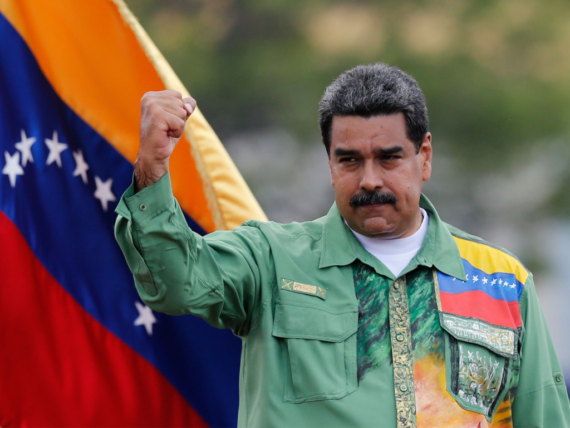
Nicolás Maduro, who became President of Venezuela after the death of Hugo Chavez, has won a second term in an election that pretty much no outside observer believes to have been legitimate:
CARACAS, Venezuela — President Nicolás Maduro won a second term as president of Venezuela, a country in the midst of a historic economic collapse marked by soaring prices, widespread hunger, rampant crime, a failing health system and a large-scale exodus of its citizens.
Electoral officials declared Mr. Maduro the victor Sunday night, in a contest that critics said was heavily rigged in his favor.
In the capital and around the country, the turnout was extremely low, with more than half of voters not casting ballots, reflecting both a call from many opposition leaders for a boycott of the vote and the disillusionment of longtime government supporters.
Voting centers in pro-government strongholds and opposition areas alike often had no lines — a significant change from previous presidential elections, and a sign that many Venezuelans repudiated the candidacies of both Mr. Maduro and the two opposition candidates.
Election officials said Mr. Maduro, the political heir of Hugo Chávez, the leftist firebrand who led this oil-rich country until his death in 2013, received 5.8 million votes, with more than 92 percent of voting centers reporting. That was nearly 68 percent of the votes cast.
His main rival, Henri Falcón, a former state governor who was once an acolyte of Mr. Chávez’s but broke with him to join the opposition, received 1.8 million votes. A third candidate, Javier Bertucci, a political novice and an evangelical minister, received 925,000. Mr. Maduro’s current term continues until the end of the year; his new term will last six years.
“So much they have underestimated the revolutionary people! So much they have underestimated me,” Mr. Maduro said, addressing a cheering outdoor crowd in Caracas. “And here we are again, victorious!”
He scarcely mentioned the low turnout and said that the 68 percent of the vote he received was the highest percentage for a winner in a Venezuelan presidential election, calling it a knockout.
Despite his triumph, there is little relief in sight for Mr. Maduro or Venezuela.
The United States — which condemned the election as unfair and anti-democratic even before it happened — has threatened stricter sanctions. Also likely to increase pressure on Mr. Maduro’s government even before his next term begins: He has largely been cut off from international financing, and the government-run oil industry, which provides virtually all of the country’s hard currency, is in free-fall, with plummeting production.
Some may also point to the low turnout and vote totals and question Mr. Maduro’s leadership. He received about 1.5 million fewer votes than when he was first elected in 2013. Mr. Maduro has shown no signs so far that he has the ability to solve the country’s deep problems, and his response to the crisis has often been to crack down harder on adversaries — including the traditional opposition as well as rivals on his side of the political divide.
The official turnout figure was given as 46 percent, compared to about 80 percent in the last two presidential elections.
Mr. Falcón accused Mr. Maduro’s party of pressuring voters and said that he would not recognize the election results.
“We don’t recognize this electoral process as valid,” Mr. Falcón said, speaking at his campaign center before the official results were made public. “For us, there was no election. There must be a new election in Venezuela.”
More from The Washington Post:
CARACAS, Venezuela — Venezuela’s pro-government electoral council declared President Nicolás Maduro the winner of Sunday’s election after a vote condemned internationally as the fortification of a dictatorship.
This oil-producing nation is facing a near-total societal collapse because of mismanagement, corruption and a crumbling socialist system, fueling widespread hunger and medical shortages that have sparked the largest migrant crisis in modern South American history. Traditional opposition parties were barred from fielding candidates and had called for a broad boycott of Sunday’s vote amid fears that Maduro was moving to cement dictatorial power.
“How much have they underestimated our revolutionary people, and how much have they underestimated me,” Maduro told a late-night crowd in front of the presidential palace. “And here we are, victorious.”
With 92 percent of the vote counted, the government announced a 46 percent turnout — the lowest for a presidential election here since the 1940s. With near-empty polling stations throughout Venezuela, the opposition coalition, known as the Broad Front, claimed that only about 30 percent of voters had cast ballots.
“We asked the people to not participate, and they listened,” said Juan Pablo Guanipa, an opposition politician.
Maduro — the anointed successor of the leftist firebrand Hugo Chávez, who died in 2013 — won a second six-year term with 67.7 percent of the vote. Given the low turnout, Maduro still fell far short of his stated goal of winning 10 million votes. The historically low participation rate appeared to sharply undercut Maduro, and suggested a turbulent path ahead as he seeks to consolidate his power.
His closest challenger — Henri Falcón, a former governor who broke with Chávez in 2010 — said he would not recognize the result and called for a new election.
Maduro’s challengers in the race, as well as the opposition coalition that called for the boycott, decried what they said were systematic election violations. Falcón said that his election monitors had been barred from observing at many polling stations, and that the government had doled out bonuses to Maduro voters.
The coalition said the government had used state-owned buses to bring in supporters at 78 percent of polling stations. Opponents also charged that government benefit registries were located illegally close at most polling places, suggesting a tit-for-tat relationship between votes for Maduro and access to state food aid.
On Sunday, U.S. Deputy Secretary of State John Sullivan said Washington would not recognize the results and was considering additional sanctions, including an oil embargo. But he also expressed caution about such a step, which could have dire humanitarian consequences on the ground.
“We don’t want to damage the country in a way that makes it difficult to repair after democracy is restored,” Sullivan told reporters.
In a defiant rebuttal, Maduro responded at a televised news conference by saying the United States was “desperate given high participation levels” in the election. “Each vote is a response to the North, which thinks it owns us,” he said.
The “election,” of course is a complete sham, just as the previous election was, and just as the “elections” under Maduro’s predecessor Hugo Chavez were. The biggest reason for that, of course, is the fact that the Maduro government prevented any serious opposition party from even appearing on the ballot. This resulted in those parties calling for a boycott of the election, something that appears to have resonated with the public given the fact that, as noted above, this election saw the lowest turnout of any national election in Venezuela since the 1940s it seems fairly clear that a solid majority of Venezuelans recognize the fact that the Maduro government is an utter fraud and that the “democracy” they live in is equally fraudulent.
All of this comes, of course, in the midst of what is accurately described above as the slow-motion societal collapse of Venezuela that has been going on in one form or another for the better part of a decade. Economically, Venezuela should be one of the wealthiest and most prosperous countries in South America. It’s oil reserves alone should be sufficient enough to be the spark for a booming economy that would benefit all Venezuelans even in an era such as we have now where worldwide oil prices, while they have risen to some small degree in recent weeks, are at relatively low rates. Instead, thanks to the idiotic socialism that Chavez and Maduro have championed, as well as the international sanctions that they have brought upon their nation thanks to their domestic and international policy, Venezuela is a nation that has over the past decade seen hyperinflation resulting in a virtually worthless currency, massive shortages of even basic items such as toilet paper, food shortages, power shortages that have led to rolling blackouts that strike at seemingly random times of the day, and rampant unemployment that has left millions of people with nothing to do and no prospect that they will find gainful employment in the near future.
At some point, one has to believe that the nation will reach a breaking point at which the economy will tumble completely over the cliff and thus lead people to start hitting the streets as they have in the past. Where that leads, though, is an entirely open question. The most hopeful outcome, of course, is that it leads to the end of the Maduro regime and the kind of political and economic reforms that the nation needs to get itself back on the right track. This would necessarily include, of course, a repair of its long-fractured relationships with the United States and with its neighbors in a way that leads to the normalization of diplomatic relationships and the kind of economic aid and investment that it so desperately needs. Alternatively, it could all further into chaos as Maduro and those around him act to tighten their grip on power, suppress the opposition, and demonize the U.S. and other nations in the name of a form of nationalism that is about as poisonous as anything we’ve ever seen out of Latin America since the Second World War. One thing that does seem clear, though, is that things are likely to get a lot worse before they get better.

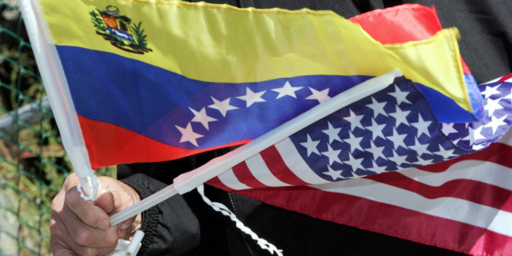
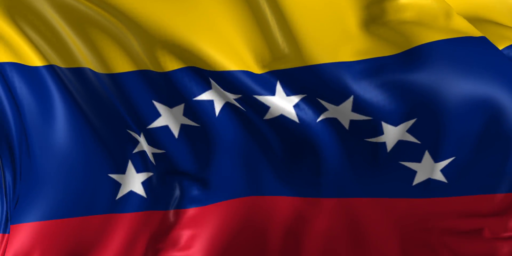
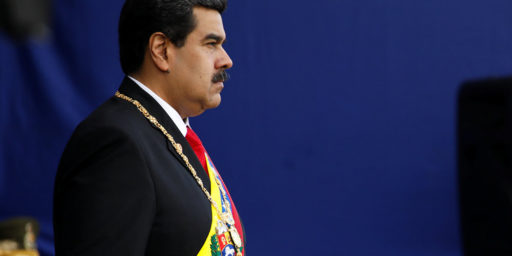
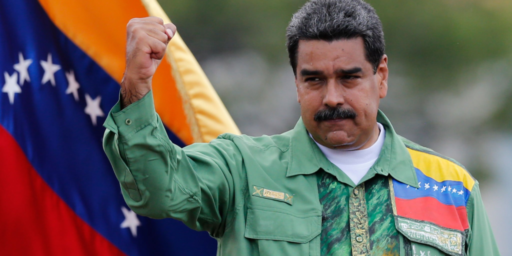
The last person to win an “election” like this one got a congratulatory call from Mangolini. I predict Maduro will feel left out, after hours of standing by the phone waiting for his call.
Fun fact: to make his travelling food show, anthony bourdain said they could get insurance to Afghanistan, they could get insurance to iraq, they could not get insurance to venezuela at any price.
“idiotic socialism”: Is there any other kind?
But anywho…This the place Bernie called The New Home Of The American Dream. I guess they’re Feeling The Bern pretty good.
@Kathy: Remember those people who used to talk about Obummer and Shrillary? Remember thinking how intelligent they sounded? How open you were to their arguments?
Tell that to folks in Scandinavia who live a hell of a lot better than you do…
@An Interested Party:
“I know that some people in the US associate the Nordic model with some sort of socialism. Therefore I would like to make one thing clear. Denmark is far from a socialist planned economy. Denmark is a market economy.”
Danish Prime Minister Lars Løkke Rasmussen
You must be The Smartest Person In The Room that I’ve heard so much about.
@TM01: Perhaps you need to examine a map, sweetie, as Scandinavia is more than just Denmark…